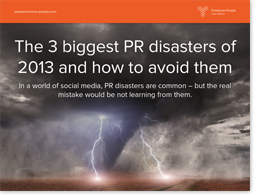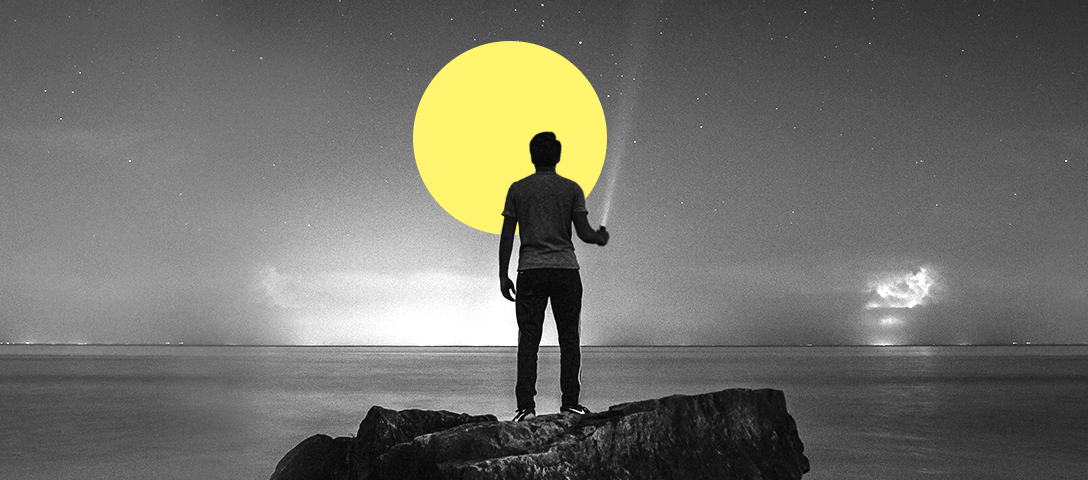
The 3 Biggest PR Disasters of 2013 and How to Avoid Them
In a world of social media, PR disasters are common – but the real mistake would be not learning from them.
DISASTER #1: THE SELF-FUNDED SMEAR
The Tweet below says it all, doesn’t it?
Don’t fly @BritishAirways. Their customer service is horrendous.
British Airways lost Hasan Syed’s bags. And didn’t respond to a complaint on their Twitter feed.
Syed was so incensed he Tweeted again. Not to his own Followers… but via a sponsored Tweet costing him $1000.
- 50,000 people in BA’s key markets viewed the Tweet.
- 18,000 news outlets covered the story in the next 7 days.
- Searching for the story today produces 11m results on Google.
WHAT WENT WRONG:
- Customers want to use their preferred channel…
- …but BA wasn’t listening.
- Because it wasn’t listening, the issue escalated.
- If a customer is $1000 worth of angry, it’s not an incident, it’s a crisis.
In fact, Syed didn’t even fly BA. Due to code-sharing, his BA-booked flight didn’t use a single BA plane.
BUT NOBODY’S INTERESTED IN THAT.
LESSON LEARNED:
Your PR has to engage across all media.
If you’re not listening on a key channel, odds on there’s a customer there getting angrier and angrier.
Public Relations today isn’t about controlling the newsflow or even about crisis management PR; it’s about engaging with your audience.
TIPS:
- Look at the media as a whole, not separate channels.
- The instant a complaint pops up, make it Code Red.
- Even if it needs ten senior managers to drop everything, it’s better than the alternative.
DISASTER #2: IT’S ALL IN THE TIMING
Another month, another big British brand in the dock. Nobody told British Gas that maybe – just maybe – scheduling a public Twitterfest on the same day you raise prices isn’t a good idea.
- 16,000 people responded.
- British Gas top-trended on Twitter within an hour…
- ….for all the wrong reasons!
- Reported by over 3,000 news outlets worldwide.
WHAT WENT WRONG:
- Mixed messages are a surefire strategy for disaster.
- One PR team was organising the chat, while the other announced 10% price rise.
- An honest attempt to engage seen as patronising.
- Led to Parliamentary investigation into energy pricing tactics.
When a news story becomes big enough for politicians to score points, you can be sure they’ll do it. The UK government’s investigation into the Big Six is ongoing, producing negative headlines to this day.
LESSON LEARNED:
Customer chats are great. But be prepared to take the rough with the smooth.
If you’re not able to engage honestly and with genuine concern – why are you in business at all?
TIPS:
- Be humble. Ranting customers are your best teachers.
- BG missed a trick. Honest engagement might have rescued the situation.
- Above all, make sure the left hand knows what the right hand’s up to.
DISASTER #3: A THOUSAND TIMES NEIGH
But the UK’s most memorable PR pile was back in January 2013: the Tesco horse meat scandal. British-sold burgers were found to contain up to 29% of our equine friends…
- 25,800 newswires reported the story over the month.
- 50,000 extra inspections ordered by UK government.
- Tesco’s share price fell 5% over three months.
.. and Tesco wasn’t helped by a flippant Tweet two days after the story broke.
It’s sleepy time so we’re off to hit the hay!…
WHAT WENT WRONG:
- Briefings focussed on how safe the burgers were to eat…
- … but the issue was horsemeat. Not how safe it was.
- Finger-pointing at suppliers was also tried – and didn’t work.
Worst of all, Tesco made excuses – perhaps the biggest sign of crisis management PR failure. Like it or not, your supply chain is your responsibility.
LESSON LEARNED:
A plea of diminished responsibility belongs in the courtroom, not the public square.
In crisis times, take responsibility, no matter what.
TIPS:
- If you’re the biggest, you’re the target.
- Try to evade responsibility and you’ll just be hit harder.
- You can’t enjoy cheap sourcing without assuming its risks.
THE BIGGER THEY COME, THE HARDER THEY FALL.
These big British names incurred multi-million pound hits to brand equity and profits.
But their losses are our gain – because we can learn from them. So keep your PR team (and not just your crisis management PR skills) on the ball:
- Always watch the horizon. A disaster seen early is a disaster averted.
- Understand you can influence… but never control. It’s engagement, not overlordship.
- Study how stories develop over time – a small-seeming risk can explode in 24 hours.
And have a crisis-free financial year!
Read the latest positioning trends and insights.
Tap into our brand and product positioning, storytelling, and creative expertise to inspire your next strategic move.


